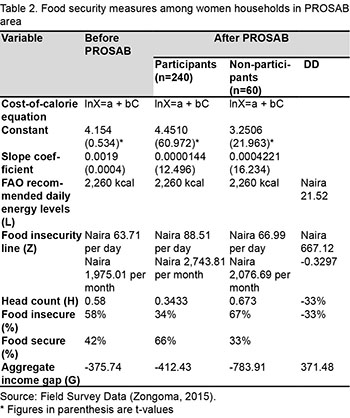This study examined the impact of improved cowpea varieties on the income and the food security status of women farmers in southern part of Borno State, Nigeria. The study used data on farmers before the Promoting Sustainable Agriculture in Borno State (PROSAB) project started in 2004 and after the project folded up about ten years after in 2015. The study specifically aimed at describing the socio-economic characteristics of women cowpea farmers in the study area; identifying the changes in income as a result of using improved cowpea seeds; analysing the impact of the improved cowpea varieties on the food security status; analysing the determinants of technical efficiency; estimating the technical efficiency in using improved cowpea and identifying the constraints associated with the use of improved cowpea varieties by women cowpea farmers.
The results indicated that a large proportion of the respondents (42% participants and 44% non-participants) were within the age group of 31-40 years, were married (68% participants and 75% non-participants) and have average household sizes of 6-8 people (data not shown). On average 66% participants and 62% non-participants were educated (up to tertiary) with mean farm sizes of 1.2 and 0.8 hectares, respectively.
| Findings from the Double Difference (DD) estimates (Table 1) showed that the average annual income of the participants increased, suggesting a positive impact on income although other factors such as age, education and marital status may have influenced income. |  |
|
The Cost-of-calorie index (Table 2) showed that, based on the daily energy level of 2,250 Kcal recommended by Food and Agriculture Organization, the food security line per adult equivalent per month was N2,743.81 and N2,076.69 for the participants and non-participants, respectively. The results also showed that 66% of the participants and 33% of the non-participants were food secure. The major constraints faced by women cowpea farmers were diseases and pests, high costs of labour and inadequate access to markets. It was recommended that policies should be formulated to encourage women farmers in the study area to adopt and sustain the use of improved varieties of cowpea. Furthermore, women farmers in the study area should be given adequate enlightenment on how to control pests and diseases and improved cowpea varieties and other inputs should be made readily available and accessible to the women farmers at affordable prices, on time and in adequate quantities. |
 |
The Cost-of-calorie index (Table 2) showed that, based on the daily energy level of 2,250 Kcal recommended by Food and Agriculture Organization, the food security line per adult equivalent per month was N2,743.81 and N2,076.69 for the participants and non-participants, respectively. The results also showed that 66% of the participants and 33% of the non-participants were food secure.
The major constraints faced by women cowpea farmers were diseases and pests, high costs of labour and inadequate access to markets. It was recommended that policies should be formulated to encourage women farmers in the study area to adopt and sustain the use of improved varieties of cowpea. Furthermore, women farmers in the study area should be given adequate enlightenment on how to control pests and diseases and improved cowpea varieties and other inputs should be made readily available and accessible to the women farmers at affordable prices, on time and in adequate quantities.
Binta Ali Zongoma, University of Maiduguri, Nigeria
(Cick here for her 2015 update)
